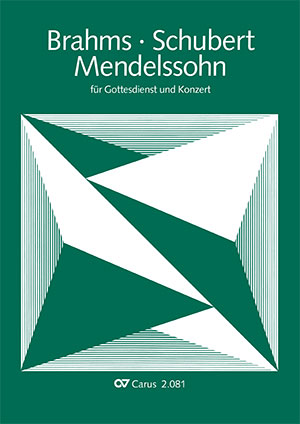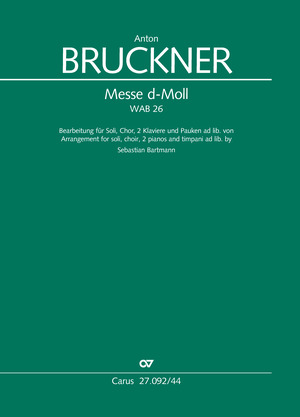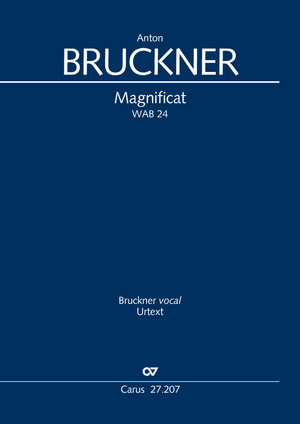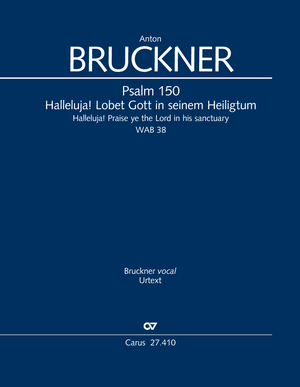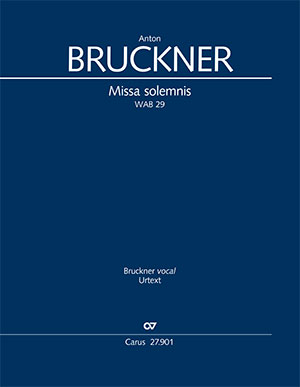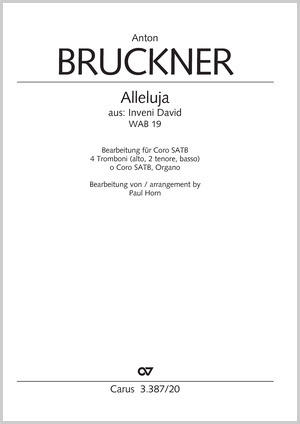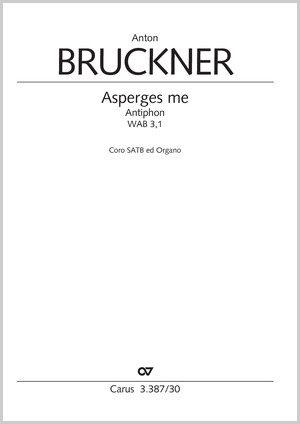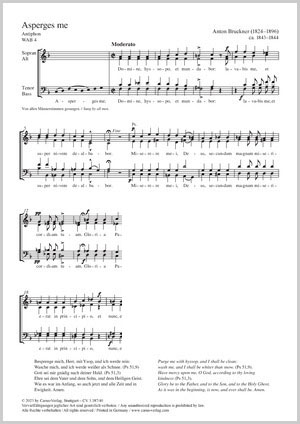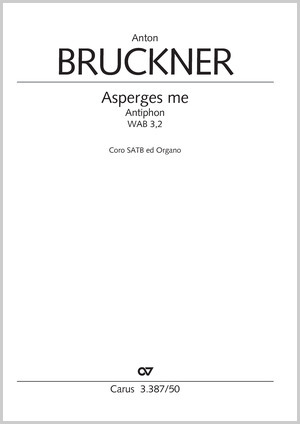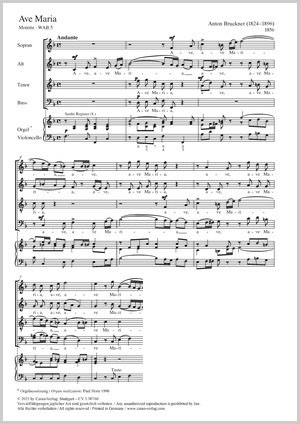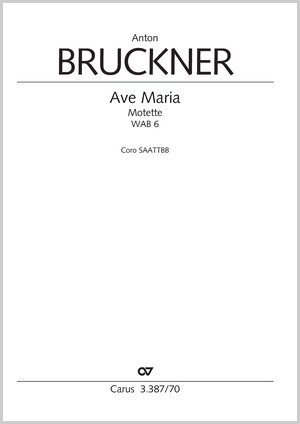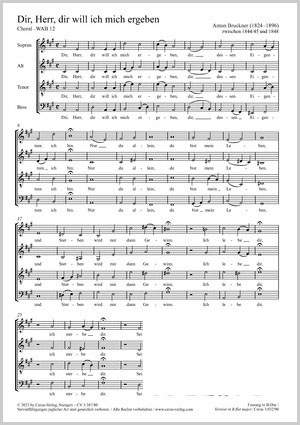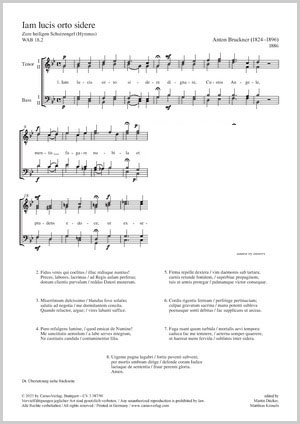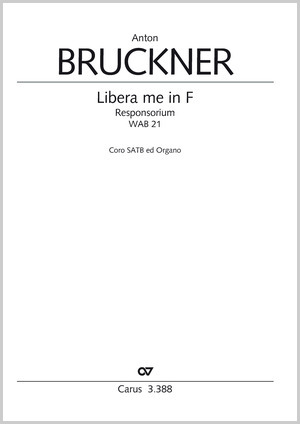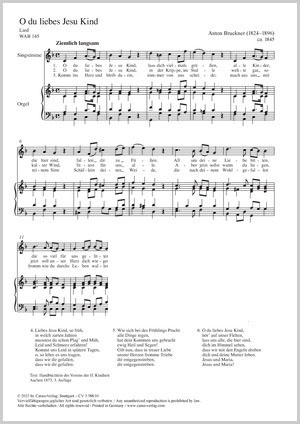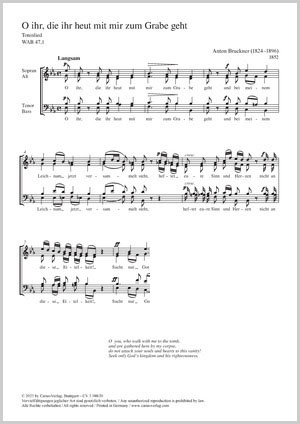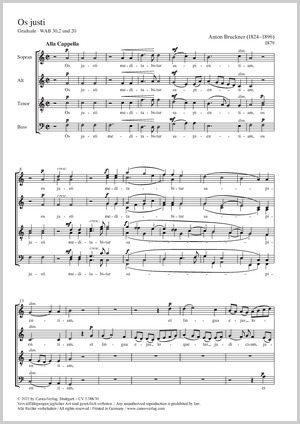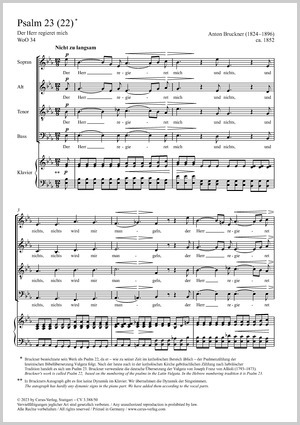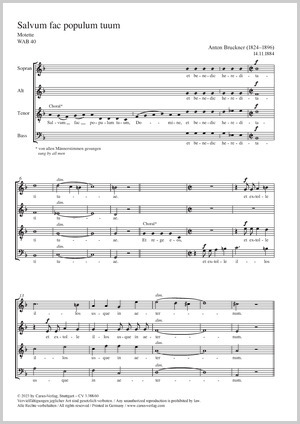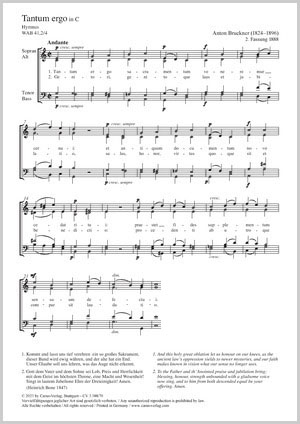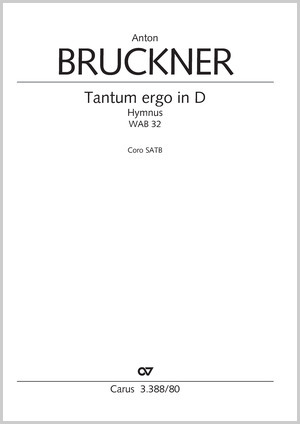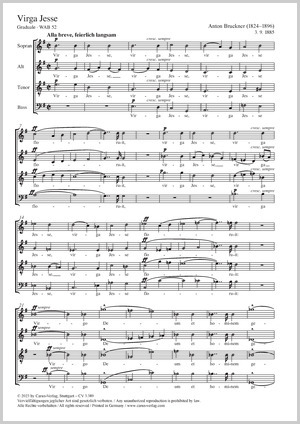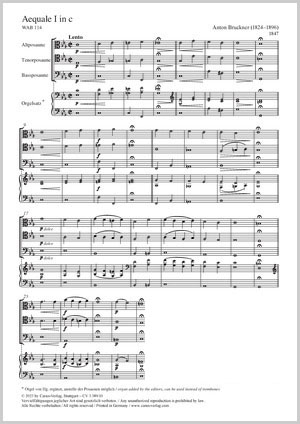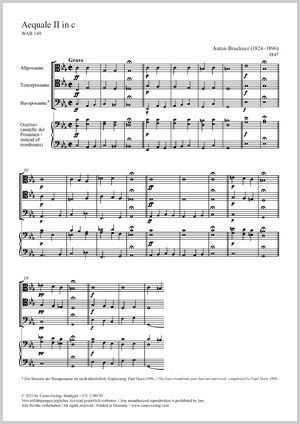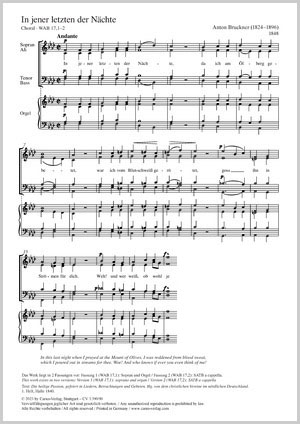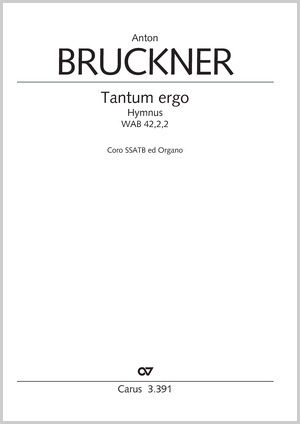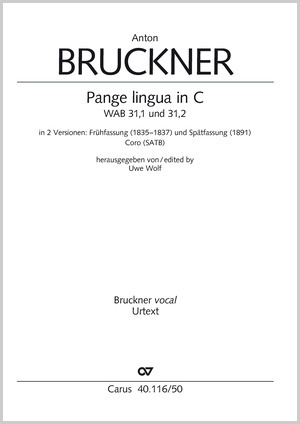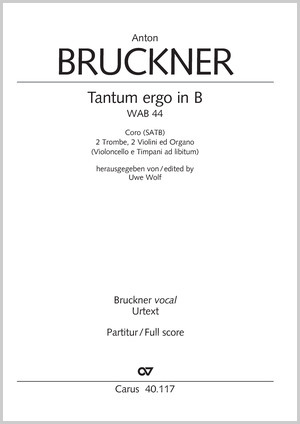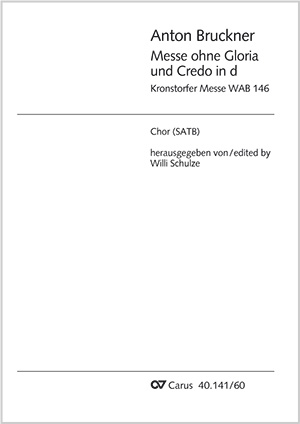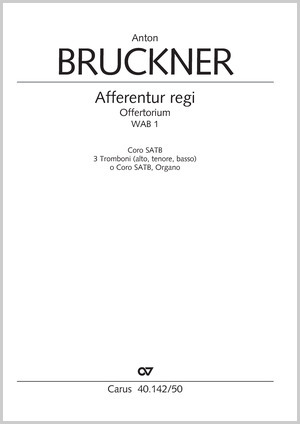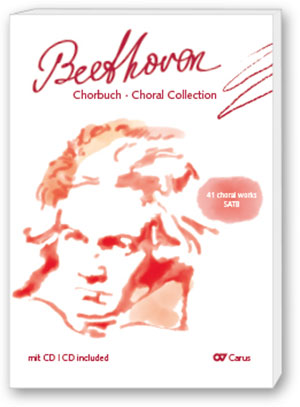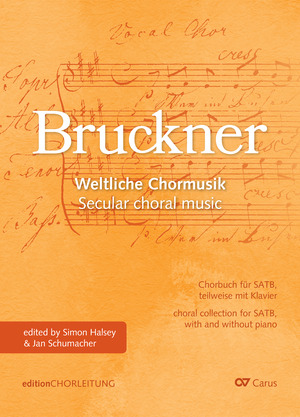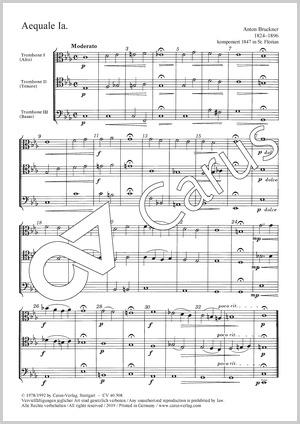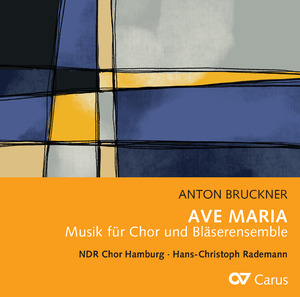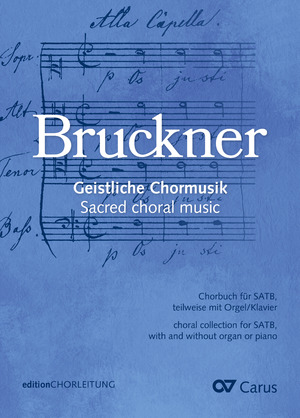
Anton Bruckner Choral Collection Bruckner. Sacred choral music
- Scoring:
- Coro SATB, teils mit Org, Pfte oder Trb
- Search for works with similar scoring
- Language:
- German/Latin
Great art in small forms – Bruckner's smaller sacred works reveal a more personal side to the master symphonist and creator of large-scale orchestral masses. Throughout his life, Bruckner’s deep faith and dedication to the Catholic liturgy inspired him to write church music in smaller forms suitable for performance at Sunday services or in sacred concerts. The long phrases and shimmering sounds of Locus iste, the chromatic modulations and thrilling climaxes in Christus factus est (1884) and in Virga Jesse (1885), or the use of church modes in almost all the motets present a range of fascinating challenges to any choir.
In addition to the well-known motets, the choral collection includes smaller sacred works such as short mass settings (a cappella or with organ) and simple liturgical songs and hymns, some with organ or occasionally with trombones. In addition, the volume presents two somewhat longer works from Bruckner’s youth: a Magnificat and a setting of Psalm 23, both with piano accompaniment.
The Choral Collection Bruckner. Sacred Choral Music is an expanded new edition of the successful choral collection Anton Bruckner für Gottesdienst und Konzert (Sacred works for worship and concert, Carus 2.065).
Several indexes supplement the musical scores in the editionCHORLEITUNG with information on the works and their liturgical usability. An affordable volume (editionCHOR) is also available for purchase, as well as separate editions in print and digital form.
- New expanded volume featuring 39 sacred choral works at all levels of difficulty
- For use both in worship and in concert
- Affordable editionCHOR volume as well as separate editions available in print and digitally
 View
View
 Listen
(17)
Listen
(17)
- Aequale I
- Aequale II
- Mass in C major
- There were brought in gladness virginews pure and lovely
- Speak, my tongue
- I have found David
- Ave Maria
- Your are beautiful, o Mary
- Ave Maria
- Locus iste
- Os justi
- Christus factus est
- Salvum fac populum tuum
- Virga Jesse
- Tantum ergo in D major
- Vexilla regis prodeunt
- Psalm 23 (22 nach Vulgata)
Contents
-
Composer
Anton Bruckner
| 1824-1896Anton Bruckner wurde 1824 in Ansfelden (Österreich) geboren und hatte kein sonderlich einfaches Leben. Der österreichische Komponist stammte aus einfachen, ländlichen Verhältnissen und wurde ein Leben lang von Selbstzweifeln geplagt. Nach dem Tod seines Vaters wurde er im Alter von 13 Jahren als Sängerknabe im Stift Sankt Florian aufgenommen. Nach mehreren Jahren als Schulgehilfe und einem autodidaktischem Orgel- und Klavierstudium arbeitete er zunächst als Organist in Sankt Florian. 1855 wurde er als Domorganist in Linz eingesetzt. Nach einer Einführung in Musiktheorie und Instrumentation durch Simon Sechter und Otto Kitzler, entdeckte Bruckner Richard Wagner als künstlerisches Vorbild, den er zeit seines Lebens bewunderte und auch mehrfach in Bayreuth besuchte.
1868 wurde Anton Bruckner Professor für Generalbass, Kontrapunkt und Orgel am Konservatorium in Wien, zehn Jahre später Hoforganist. 1891 bekam er schließlich einen Ehrendoktor der Wiener Universität. Er galt als wichtiger Orgelvirtuose seiner Epoche, seine kompositorische Anerkennung ließ jedoch auf sich warten. Erst die zwischen 1881 und 1883 entstandene Symphonie Nr.7 in E-Dur mit dem unter dem Eindruck von Wagners Tod entstandenen berühmten Adagio brachte die erhoffte Anerkennung, auch wenn er sie angesichts seiner Tendenz zur Skepsis und Selbstkritik nicht wahrhaben wollte.
Anton Bruckner war ein Einzelgänger, der sich keiner Schule oder Lehrmeinung anschließen wollte. Er schrieb sowohl geistliche als auch weltliche Werke in all ihren Facetten. Neben zahlreichen Motetten komponierte Bruckner drei Messen, die Missa Solemnis b-Moll (1854) und das beim Carus-Verlag erhältliche Te Deum (1881–84; CV 27.190/00). Als Symphoniker schrieb er von 1863 an insgesamt neun Symphonien und viele symphonische Studien, wobei er dazu neigte, fertige Fassungen mehrfach zu überarbeiten. Bruckners Orchesterwerke galten lange als unspielbar, waren aber lediglich für die Tonsprache ihrer Zeit ungewöhnlich kühne, die Traditionen von Beethoven über Wagner bis zur Volksmusik vereinende Klangmonumente an der Grenze von Spätromantik und Moderne. Personal details
-
Editor
Matthias Kreuels
| 1952
-
Editor
Martin Dücker
| 1951
Reviews
Insgesamt ist die Ausgabe nachdrücklich zu empfehlen: Mit wenig Aufwand können Chöre die Stücke unterschiedlicher Schwierigkeitsstufen aufführen, sodass Bruckners kleinere geistliche Werke einem größeren Publikum präsentiert werden können.
Chorzeit, No. 105. Juni 2023
Der Gesamteindruck dieses Bruckner-Chorbuchs … ist ausgezeichnet und bietet selbst für den Bruckner-Kenner lohnende Neuentdeckungen.
Musik & Kirche, Juli/August 2023
Eine wichtige Repertoirefundgrube für Kirchenchöre aller Größen.
Singende Kirche, September 2023
Reviews on our website can only be submitted by customers with a registered user account. A check whether the rated products were actually purchased does not take place.
Frequent questions about this work
What is the difference to Choral Collection Bruckner Sacred works for worship and concert (Carus 2.065/00)?
 There are no questions and answers available so far or you were unable to find an answer to your specific question about this work? Then click here and send your specific questions to our Customer Services!
There are no questions and answers available so far or you were unable to find an answer to your specific question about this work? Then click here and send your specific questions to our Customer Services!




